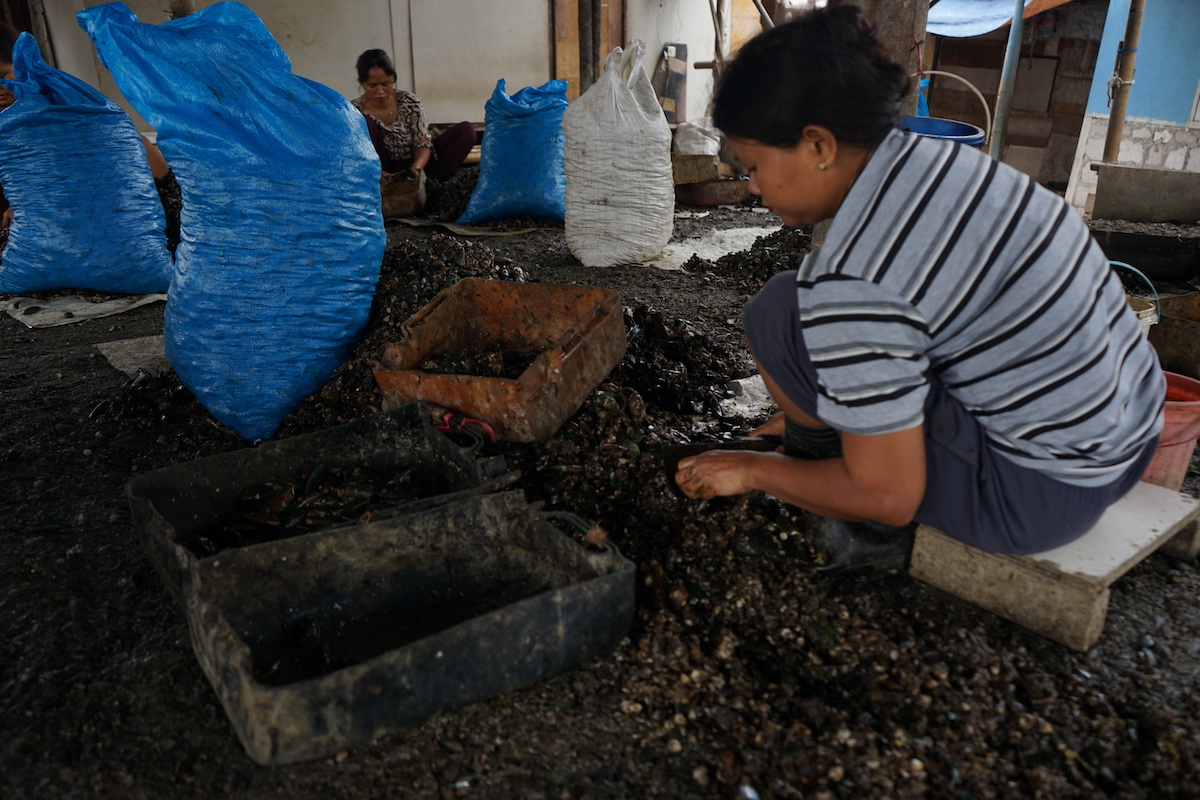Muara Angke is one of the busiest ports in Jakarta, serving fishing vessels and ferries connecting the mainland and the Thousand Islands. The area ordinarily bustles with life thanks to a major fish market and traditional fishing villages.
But that was before the pandemic. The port, these days, is practically bereft of human activity compared to its heyday, and 60-year-old clam digger Pasariban is feeling the heat.
Over at Timbul traditional market in Jagakarsa, South Jakarta, 30-year-old frozen foods seller Reni Yulianti had gone through her daily ritual of waking up at 3am, preparing breakfast, and doing household chores before leaving the house at 4am to open her stall.
Sumarni, 67, came to Jakarta from Sumenep, Madura in the early 1980s with nothing but a pack of bags and high hopes for a better future. She settled in a Maduranese community settlement in Kwitang, Central Jakarta now known as Kampung Starling, the latter being a play on the phrase “Starbucks keliling” (mobile Starbucks), in reference to the fact that almost all of its residents sell coffee on wheels. Unlike them, however, Sumarni peddles soft drinks.
Scavenging is by no means a decent job. But for 27-year-old Ade Heri Susanto, picking waste is still better than nothing. But, like many informal workers in Jakarta, greater uncertainty looms over his life more than ever before due to the pandemic.
For all the tragedy it has inflicted, COVID-19 has also exposed the extreme vulnerability of informal workers. While some people have the privilege to work from home during the pandemic, informal workers have no choice but to go out there, making around or less than IDR100,000 (US$6.92) per day. Most of them have no access to Indonesia’s BPJS universal healthcare program. And for all the talk of social distancing and the wearing of face masks, the reality is that health protocols do not take priority in their line of work.
Pasiban
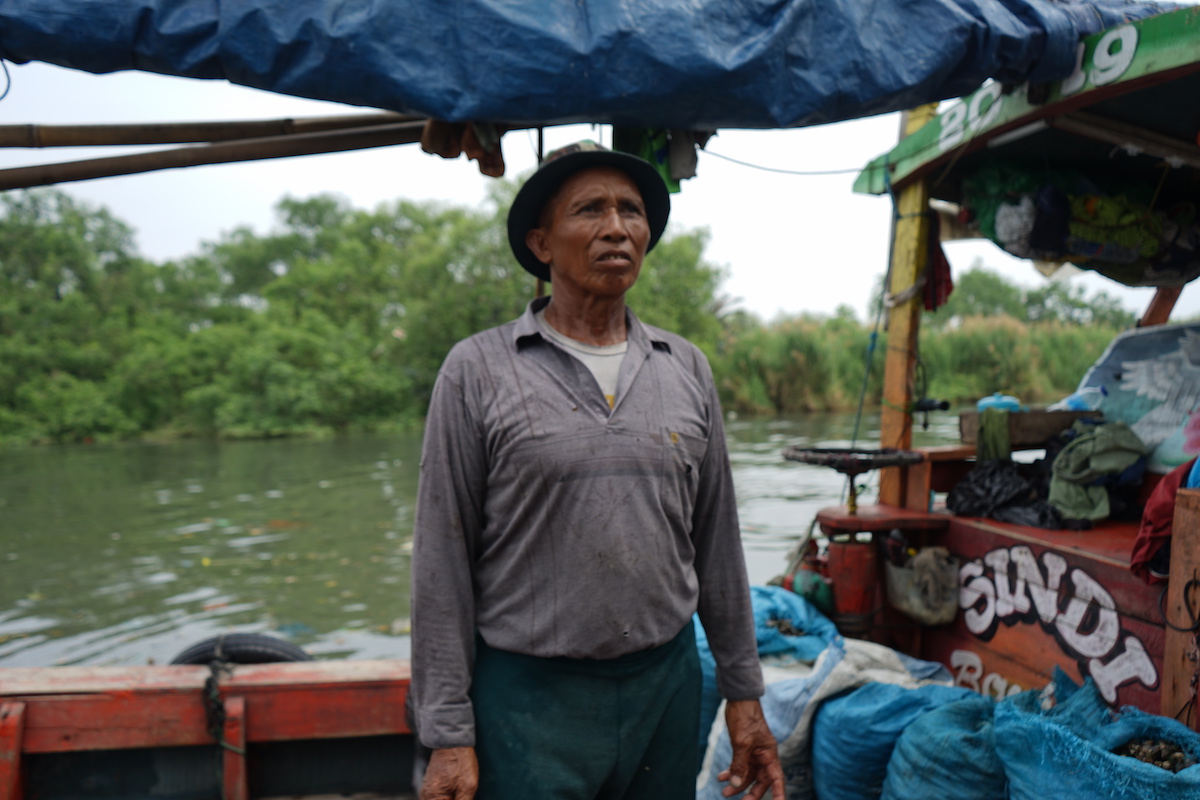
“The demand is simply decreasing,” says Pasiban, who migrated to Jakarta from Indramayu regency in the early 1990s. “We can’t sell as much as we used to [before the pandemic].”
Muara Angke has seen both natural and man-made threats over the years. The port suffers from tidal floods each year, while the livelihoods of its fishermen are threatened by an ongoing and controversial land reclamation project. Due to climate change and excessive groundwater extraction, some parts of North Jakarta, including Muara Angke, are predicted to sink by 2050.
Now it must face one of the worst pandemics in human history.
The traditional fishing villages in Muara Angke offer a grim picture of closely packed decrepit houses without proper sanitation and infrastructure, inhabited by more than 8,000 people. The villages lack fresh water, while tons of household waste inundate the port.
The foul odor of dried fish and blocked drains dominate the atmosphere. There are portable hand-washing stations provided by NGOs in the alleys, but the soap bottles are all practically empty.
Pasiban was unloading sacks of green clams from his boat that afternoon with the help of his two sons. Every day he would travel to Bidadari Island, about 20 kilometers north of Muara Angke, to harvest green clams. He employs five of his neighbors to help him process the clams before they are sold to the market.
Before COVID-19 struck, Pasiban regularly harvested around 100 kilograms of green clams that he would sell for IDR10,000 per kilogram at a nearby fish market. The price has dropped considerably since March, all the way down to only IDR2,000 per kilogram. He has no option but to decrease his daily catch by around 70 percent.
“Now I can only bring home around 30 kilograms of clams,” Pasiban said. “There’s no point in bringing home more clams as there wouldn’t be any buyers.”
Pasiban and his employees don’t wear face masks at work, which they say are inhibiting in their physically demanding line of work. Hand sanitizers are useless, Pasiban said, as they literally get their hands dirty sorting the clams anyway.
Pasiban’s main concern during the outbreak is economic rather than health and safety. He said he does not have health insurance and does not plan to have one.
“I am afraid [of contracting the disease],” says Pasiban. “But what else can I do?”
Pasiban says he’s lucky to still be able to support his family. Most of the fishermen he knows are no longer able to fish as they could not cover their operational costs. The cost of a fishing trip, which covers fuel and basic necessities, range from IDR200,000 to IDR500,000 depending on the distance traveled.
“Some of them have sold their belongings to survive,” Pasiban said. “In my case, I can probably still be able to support my family for the next two months. After that I don’t know. I may sell my motorbike or jewelry.”
Residents of Muara Angke receive assistance from government agencies and NGOs, but Pasiban said that while it’s better than nothing, it’s far from sufficient. Some aid packages contain staple foods that can barely feed a family of four for a week.
“I don’t know how we can get through this. But lessons learned, we need to be better to prepare for the worst when there’s a crisis. That includes how the government should respond,” he says.
Reni Yulianti
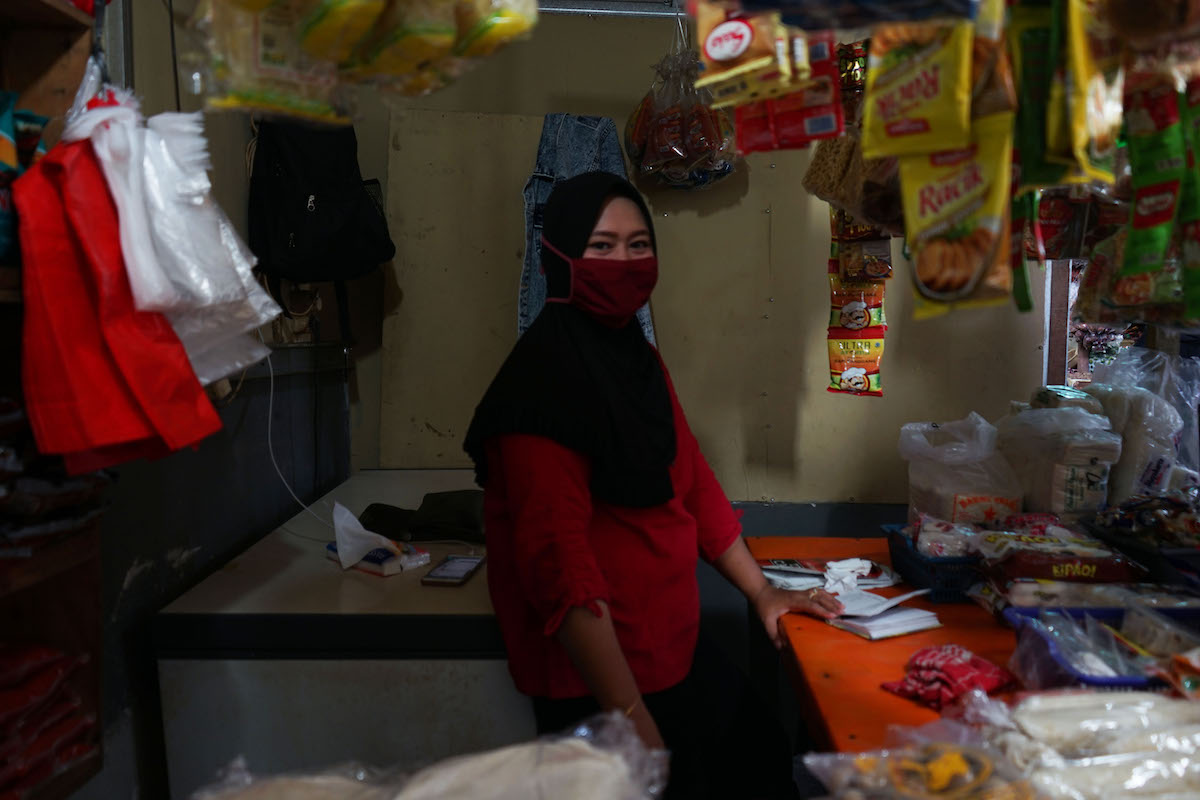
Timbul market has around 50 stalls selling meat, fruits, vegetables, and other basic necessities. Reni manages a cramped kiosk that she rents for IDR3 million per month with her cousin. She is in charge of the 5am to 5pm shift while her cousin would take over until 10pm. Her kiosk specializes in frozen food such as chicken nuggets, fish, meatballs, as well as various instant foods.
While most people are told to stay at home during the city’s Large-Scale Social Restrictions (PSBB), workers like Reni are allowed to run their businesses normally.
But for Reni, it doesn’t feel normal at all.
The number of customers has fallen significantly during the pandemic, as people are avoiding traditional markets for fear of contracting the disease. Before the pandemic, Reni managed to bring home around IDR400,000 per day. Her income has decreased by 70 percent during the outbreak.
“Most people are now shopping online for groceries or food,” she says. “I am not complaining.”
While the city’s market operator PD Pasar Jaya has launched a shop-from-home program by providing contact information of sellers on its website to allow customers to call them directly, Reni has yet to be enrolled in the program.
PD Pasar Jaya manages 105,223 stalls at 153 markets across the capital. Before the pandemic, the market operator recorded around two million visitors per day across all of its markets. Although no official data is available since the outbreak began, officials, unsurprisingly, are predicting a huge downturn.
Despite her struggles, Reni still managed to enroll herself and her family into BPJS. At work, she follows all safety guidelines for fear of bringing the disease home. She wears a cloth mask and sanitizes her hands frequently during work.
“I am scared all the time,” Reni explained. “I meet all kinds of people. Not to mention that I have to accept bills from customers. I am afraid that I will become the carrier.”
Reni said she has not received financial assistance to help her business stays afloat, despite repeatedly hearing about aid programs by the government. As long as she could still bring home some profit, she thinks she can get by.
“My lifestyle has changed a bit,” she laughed. “My personal hygiene is getting better. I wash my hands countless times. I try to implement physical distancing whenever I can. And I try to cut the household budget to survive. If we usually eat chicken, now we just change it to other dishes.”
Despite health experts and scientists predicting that the coronavirus will be here to stay, Reni believes that everything would return to normal soon, that the disease would disappear in the near future. She hopes that within the next two months, her financial situation will improve.
“I believe that,” Reni said. “I don’t think that the virus will stay forever. But how about the economy? Who knows. I hope we will get better within two months.”
Sumarni
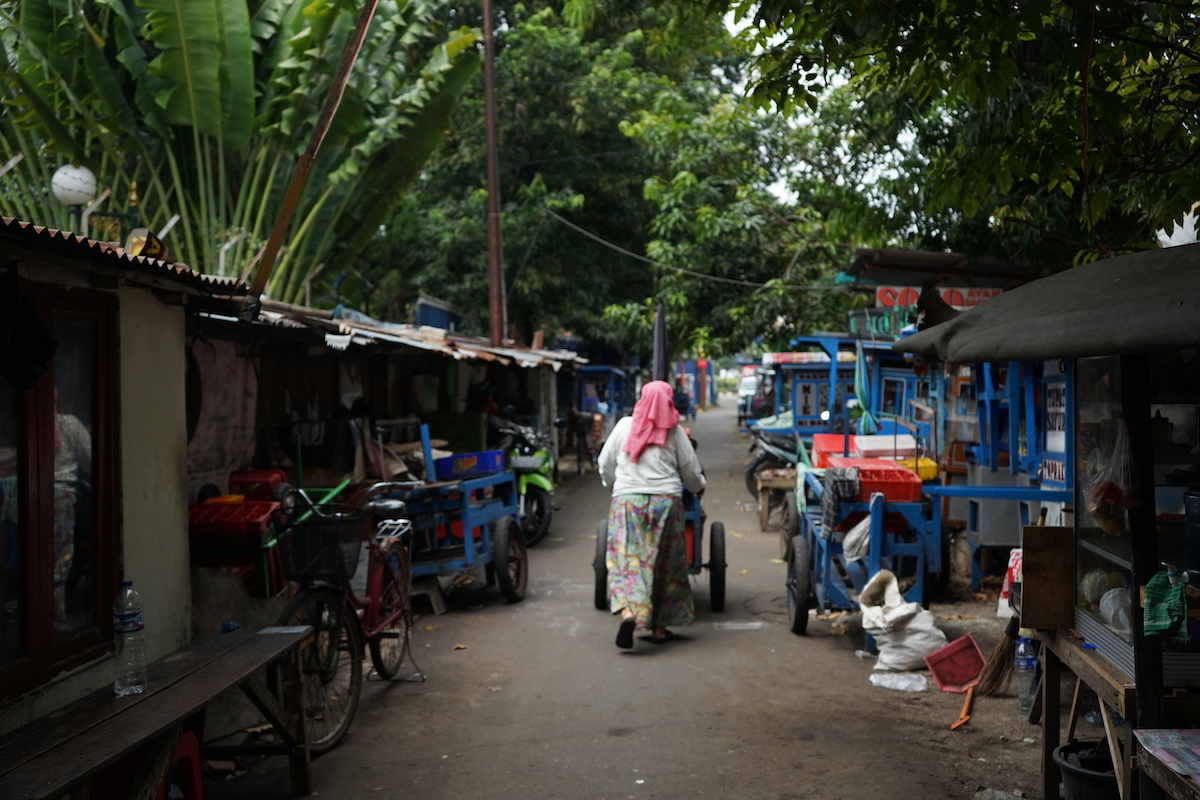
There are between 500 to 1,000 coffee sellers living in Kampung Starling. Almost all of them originated from Madura, East Java. The lively village is now practically deserted, with bikes parked in front of empty houses. Sumarni came out of her house pushing her cart full of soft drink bottles and plastic cups.
“Almost all of the sellers went back to their hometowns,” Sumarni said as she pushed her cart. “There aren’t any jobs left in this city.”
Most Starling sellers usually serve urban workers around Jakarta, roaming big streets and selling instant coffee in front of high-rise buildings. But the outbreak has forced most Jakartans to work from home, robbing mobile coffee sellers of their regular customers. Most sellers had no choice but to abandon their bikes and coffee. Flee or die.
While the government has banned people from leaving or entering Jakarta since PSBB, the enforcement has left a lot to be desired. Case in point: a few weeks before the Islamic religious holiday Eid al Fitr, around 300,000 vehicles were recorded leaving the capital.
“Only the rich can stay at home,” Sumarni said. “This job is all I know. This is how I feed my family. We, the poor, can die if we just stay at home. No one would help us.”
Before COVID-19, Sumarni just pushed her cart across the street and waited for customers. She was able to bring home IDR400,000 on a good day. Now, she only earns IDR20,000-50,000 per day.
It’s almost impossible to rely on the government’s assistance, she said, as aid does not come regularly. When it does come, most aid packages consist only of a sack of rice, cloth face masks, biscuits, and canned sardines.
“We can barely survive with just a sack of rice and two canned sardines,” Sumarni said, citing the contents of the government’s aid package. She only hopes that the government or NGOs would help keep her business afloat by injecting capital. “If I can’t make enough money for the next few months, that’s it. I don’t know. I don’t want to be a burden for my kids.”
Considering her age, Sumarni is in the high-risk group for COVID-19. But for her and her neighbors, physical distancing in a densely populated village is almost impossible. With her income, she can’t afford health insurance.
“But I wear a face mask while at work,” Sumarni says. “Isn’t it enough to prevent the virus?”
Ade Heri Susanto
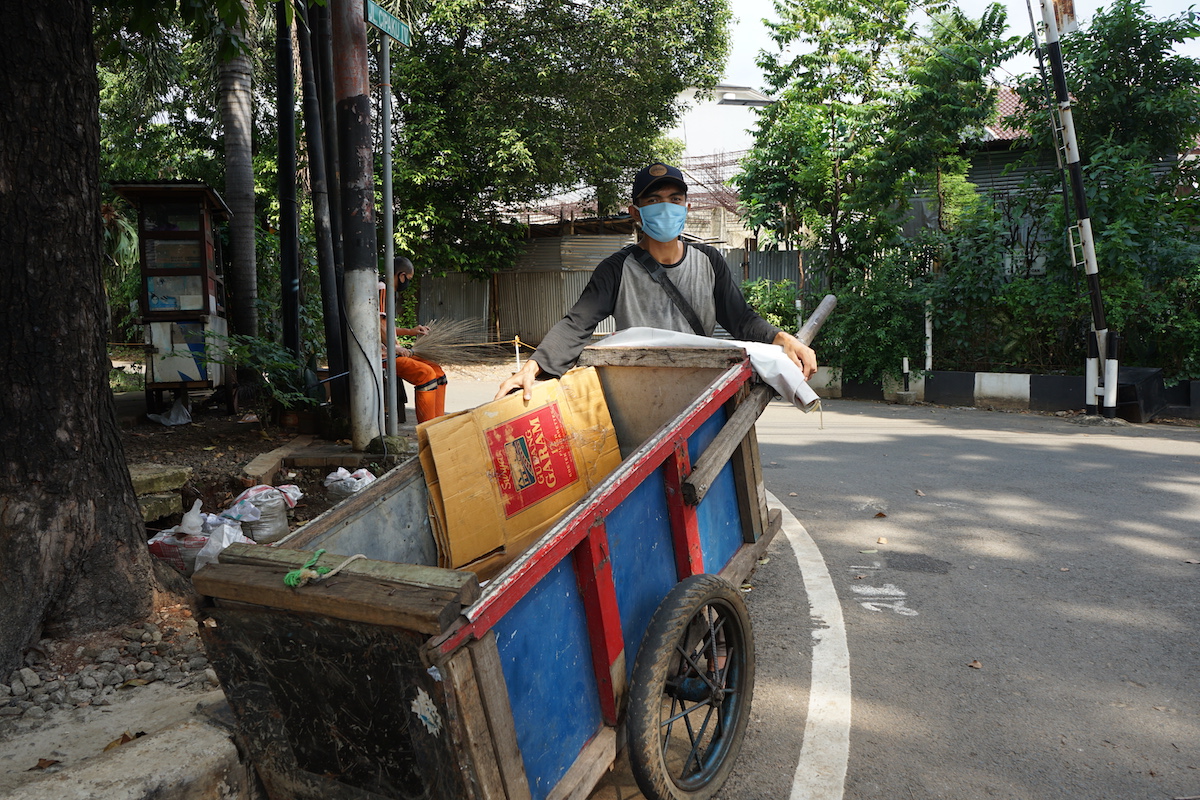
Before he scavenged for a living, Ade was a manufacturing worker at a major Japanese electronic company in Cikarang, West Java for a year. But he left that gig over contractual uncertainties.
“Manufacturing companies are always looking for young workers,” Ade, who married at a young age, said. “And every time my contract ends, I feel insecure so I didn’t want to apply again. So I left the job.”
He was jobless for eight months before picking up a job as a scavenger. His father-in-law was a scavenger, and Ade saw that this was an honest living that could allow him to support his family of four. “I am not ashamed,” he said. “There’s nothing wrong with it.”
Ade pushes his cart from dusk till dawn around housing and office compounds in South Jakarta, picking up stacks of old newspaper and cardboard boxes. He sometimes picks up old electronic devices too. He can sell a kilogram of newspapers for IDR3,000 at a garbage collector for further processing in Mampang Prapatan, South Jakarta.
“I used to pick up plastics too, but they’re worthless now because the processing facilities were shut down during pandemic,” Ade says.
His pushcart was half empty. On a good day, that cart would be full of paper waste. He blamed local lockdowns for his bad luck.
“Some housing compounds imposed local lockdowns, so I can’t get in. They now refuse strangers from entering the compound. Offices are closed too. So I just take whatever I can get,” Ade said, adding that he can now only sell around 10 kilograms of newspaper and bring home IDR30,000 daily.
Local lockdowns are a response from communities who were moved to act due to the government’s slow response to COVID-19. Many villages across the country walled themselves off after the government confirmed its first two cases in early March.
Ade’s constant exposure to waste means he should be deathly afraid of the coronavirus, but he said he doesn’t want to go over the top with personal hygiene. “It would be insane. How much hand sanitizer would I need?” he laughed. “I just wash my body every time I get home.”
The scavenger is also reluctant to apply for health insurance nor does he plan to ask for the government’s assistance.
“If PSBB is lifted and businesses resume to normal, I think my income will return to normal too,” Ade says. “I have nothing to worry about.”
